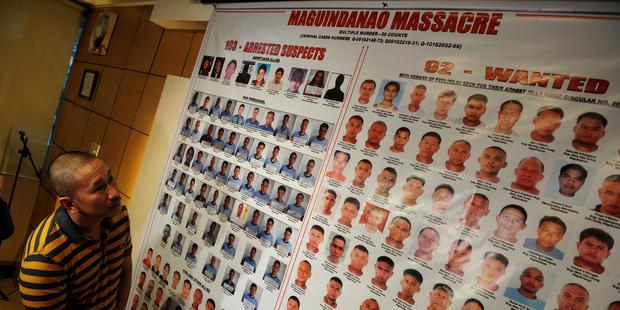- 26 Nov 2014
- [International Secretariat]
- Region: REPUBLIC OF THE PHILIPPINES
- Topic:

Maguindanao Governor Esmael Mangudadatu, who lost relatives in the Philippines' worst political massacre, looks at pictures of the suspects.(C)NOEL CELIS/AFP/Getty Images
The Philippine authorities are running out of time to ensure that their response to the Maguindanao massacre does not become a mockery of justice, Amnesty International said on the fifth anniversary of what is often called the world’s largest-ever single attack on journalists.
On 23 November 2009, 58 people, including 32 journalists and other media workers, were killed when an election convoy came under attack by more than 100 armed men, allegedly including members of the police and the military. The convoy had been travelling in the southern province of Maguindanao, through the territory of the powerful Ampatuan clan.
“Justice delayed is justice denied. Five years after the Maguindanao massacre, the cases are still inching through the Philippine court system and not a single person has been held to account,” said Hazel Galang-Folli, Amnesty International’s Philippines Researcher.
Almost half the 197 suspects for whom arrest warrants have been issued since the massacre remain at large. Meanwhile, no prosecution has been concluded, nor has any perpetrator been convicted.
Trials in the civil and criminal cases are ongoing at a Quezon City Regional Trial Court. However, there have been several delays and setbacks and most of the court proceedings have been bail hearings. The families of the victims have also called on the National Police Commission to dismiss police officers allegedly involved in the assault, but it remains to be seen how these demands will be dealt with.
Witnesses to the massacre and their families have faced attacks and killings since the massacre, highlighting a lack of government protection. Just this week yet another prospective witness was killed in an ambush in Maguindanao province. At least eight witnesses and their family members have been killed in such attacks since November 2009. No one is known to have been held accountable for these killings either.
“Each killing of a witness creates a fresh injustice while reducing the chances of justice being served for the families of the victims of this horrific massacre. This is particularly true in a country like the Philippines where court cases have traditionally relied heavily on witness testimony,” said Hazel Galang-Folli.
“The Philippine authorities must get their act together and ensure that accountability for this horrific massacre is given high priority and enough resources.”
Dennis Sakal and Butch Saudagal, both of whom were expected to testify against the primary suspects in the massacre were gunned down by unidentified men in Maguindanao on 18 November 2014, killing the former.
Alijol Ampatuan, who according to prosecutors was willing to identify perpetrators, was shot at close range in February 2012. Esmail Amil Enog, who testified in court that he had been a driver for gunmen implicated in the massacre, was found chain-sawed into pieces after disappearing in May 2012.
23 November 2014
AMNESTY INTERNATIONAL PRESS RELEASE
Related Actions
- 7 Nov 2022
TORTURE SURVIVOR FACES THIRD ARREST - 1 Sep 2022
OMBUDSMAN DISMISSES BRIBERY CHARGES VS LEILA - 26 Nov 2021
FEARS OF TORTURE FOR ABDUCTED ACTIVIST - 15 Jul 2020
FEARS OF UNFAIR TRIAL FOR ‘TACLOBAN 5’ - 25 Apr 2020
RESIDENTS SEEKING COVID-19 RELIEF CHARGED
Related Newses
- 17 Dec 2019 [International Secretariat]
REPUBLIC OF THE PHILIPPINES: Landmark decision by Human Rights Commission paves way for climate litigation - 18 Jul 2019 [International Secretariat]
REPUBLIC OF THE PHILIPPINES: UN resolution builds pressure on architects of deadly “war on drugs” - 20 Feb 2019 [International Secretariat]
REPUBLIC OF THE PHILIPPINES: Arrest warrant against Rappler’s Maria Ressa shows authorities ‘railroading’ case - 15 Feb 2019 [International Secretariat]
REPUBLIC OF THE PHILIPPINES: Lowering criminal age to 12 could ‘tear families apart’ - 6 Feb 2019 [International Secretariat]
REPUBLIC OF THE PHILIPPINES: Peace advocate gunned down in yet another targeted killing




